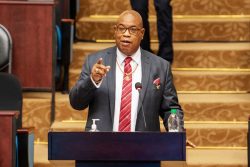One of the iconic images of this pandemic period was captured on Sunday in Denver, Colorado in the US. As a matter of fact, there were several of them, including videos that depicted what appeared to be healthcare professionals blocking the way of protestors in vehicles. The protestors were demonstrating against the state calling on the governor and officials to allow businesses to reopen and operate as normal because they needed to work. The counter-protestors, many news reports said they were nurses, were few in number and they simply blocked the cars from proceeding, standing their ground in the face of threats and abuse.
The protest in Colorado, mirrored those held in Michigan, Ohio, Kentucky, Maryland, North Dakota, Texas, Florida, western New York state and Washington state among others. But the US is not the only country where this is taking place. Police in India quelled an anti-lockdown protest by people who could not get home because the public transit system was not operational. There have also been anti-lockdown protests in Jerusalem. And right next door in Brazil, there was a large protest on Monday last. In this instance, the Brazilian President Jair Bolsonaro joined the protest. Like the US, Brazil has states, whose governors have control over when their lockdowns will end. Mr Bolsonaro’s action will no doubt embolden protestors who may go too far. He claimed that his participation in the protest had been misinterpreted, but that he had a right to his opinion and simply wanted people to be able to return to work.
US President Donald Trump has more than likely taken the same stance. He has been tweeting “Liberate -” followed by the name of the state in support of the anti-lockdown protests. On Sunday last, at the White House’s daily coronavirus media briefing, he told reporters that the protestors were “good people” who had “cabin fever” but who loved their country and just wanted to get back to work. His statement was in response to a reporter who asked whether he was inciting violence with his tweets since the Democratic governors of Michigan, Kentucky and Virginia had all received death threats over the lockdowns in their states.
The right to peacefully protest is enshrined in the Universal Declaration of Human Rights, which was proclaimed by the United Nations General Assembly in Paris on 10 December 1948. According to Article 20: “Everyone has the right to freedom of peaceful assembly and association.” The two prior articles speak to the rights to freedom of opinion and expression and freedom of thought.
The US’s decree on these rights predates the UN’s by over 150 years. The US Constitution states in its First Amendment, adopted in 1791, “Congress shall make no law… abridging the freedom of speech, or of the press; or the right of the people peaceably to assemble…”
However, both the UN’s declaration and the First Amendment speak to peaceful assembly. Therefore, if violence enters the equation those involved can be prosecuted. With rights also come responsibilities: they are not a blanket entitlement to do as one pleases. Consequently, some people’s right to protest peacefully should not supersede others’ rights to safety and order in public places. Those who arrogantly believe their voices should carry above others are replacing right with might.
In defending anti-lockdown protestors, President Trump and President Bolsonaro are acting in contradiction of the public good. Covid-19 can be transmitted by carriers who might be asymptomatic, which was why there was need for the closures and separation. Protestors jammed together in defiance of the guidelines set out by health authorities and state officials, not only put themselves and others at risk, but present the danger of overwhelming health facilities which have already been stretched to their peak.
With some 2.5 million total cases, 1.7 million of which are active, the world is nowhere near beating this thing. While in some countries there has been a slowing down of the infection rate, overall, there are still new cases every day. The US, leading the world, was heading towards 800,000 cases as of Monday. The next closest country was Spain with just over 200,000 cases. Brazil’s figure was over 40,000.
Only the truly blind would fail to see that all the figures quoted above would have been far higher if steps were not taken to close borders and businesses and ask people to stay home. Operating in limbo is unchartered territory for most people and no one wants to see their country’s economy in the pits but weighed against life right thinking people would choose the latter. It’s a pity that the leaders of two of the largest economies in the Americas do not fall into this category.






